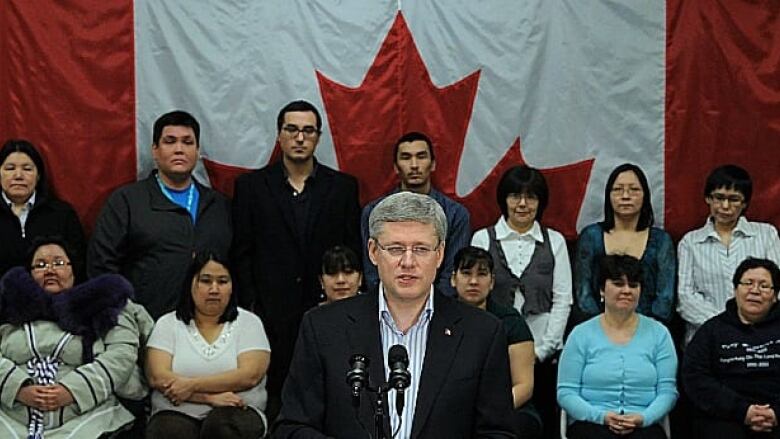Harper shows little sympathy for provinces' budget beefs
Despite austerity fears, finance minister still pledging budget that's 'moderate in its approach'

Prime Minister Stephen Harper delivered a cold reality to provinces on Thursday: his election promises trump any concerns they may have about how federal actions may affect provincial finances.
In Iqaluit to announce education funding, the prime minister took the opportunity to shed light on how federal-provincial relations will work now that he has a majority.
Asked about provincial and territorial governments trying to stretch thin resources to house aprison population that will growas a result of Harper'scrime legislation, the prime minister made no apologies.
"We received a clear mandate to proceed with strengthening our criminal justice system to make sure those who commit serious crime do appropriate prison time," he said to an audience that included Nunavut's justice minister.
"We understand that obviously some of the administration of that is the responsibility of the provinces and territories, but we're acting on a clear mandate of the people."
And when asked whether he should heed warnings the economy can't absorb chopping at the federal level whileOntario begins a period of deep austerity, Harper said the provinces' affairs were not his affair.
"We ran on a clear mandate to create jobs and growth, and to do that by making investments while at the same time making sure that our deficit falls and we return to balance. That's the program on which we ran," he said in the question-and-answer at Nunavut Arctic College.
"That approach has been widely supported by analysts both inside the country and around the world, so I think that's the appropriate course. Obviously, other ... governments will have to make their own decisions in their own context."
Canada has won accolades around the world for handling the last recession well. But the federal debt and deficit are widely considered to be in reasonable shape, prompting some experts and insiders to question whether now is the time for cuts.
Flaherty promises moderation, not draconian cuts
Harper is poised to deliver a spring budget that will slice billions in federal spending,overhaul old age securityso that long-term costs are far lower, and put health care transfers on a far less expensive track.

But the belt-tightening in Canada won't be nearly as austere as what Europe is going through, Finance Minister Jim Flaherty took pains to point out earlier in the day.
"I think Canadians should realize our context, this is not an austerity situation in Canada," Flaherty said when asked about his coming fiscal blueprint.
"We are not one of the countries, many of them in Europe, that have run up deficits for a long period of time, accumulated substantial debt and must really act dramatically -- some of them in a draconian way in order to get their house in order again."
Flaherty reiterated that the federal government grew as part of the Conservatives' economic action plan during the global recession and "we will have to have some moderation of that."
But he added: "As I say this is not austerity, this is not draconian, it will be moderate in its approach."
Harper's brand of federal-provincial relations has become clearer since he won a majority last May. He has given increasing attention to areas in federal jurisdiction -- such as Aboriginal Affairs -- while making it clear he wants little to do with provincial areas of responsibility, even if there are national implications.
His move in December to unilaterally set out the path of health care transfers for the coming decade is the most obvious example.
But the pleas from many a justice minister to help out with the implementation costs of the federal crime agenda, and the insistence of the federal government on reforming old age security even if provinces have to pick up extra welfare costs, are other cases in point.












_(720p).jpg)


 OFFICIAL HD MUSIC VIDEO.jpg)
.jpg)



























































































